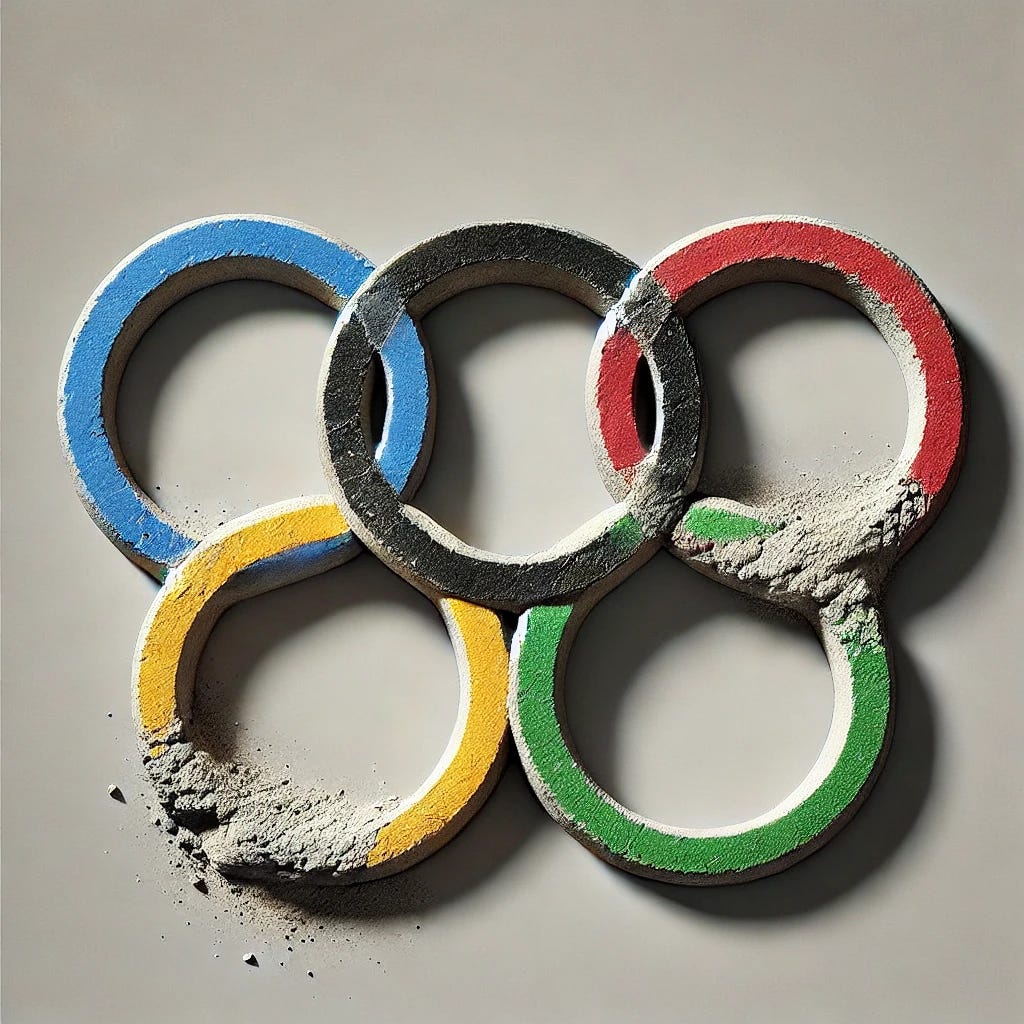Why America's Olympic Pipeline Might Start Leaking
An NCAA settlement could have a profound impact on the sports you've been watching
**This post is a slightly longer version of a Q&A that was done for The Washington Post’s Guest Opinions page. The Post kindly allowed me to co-publish it here.**
One of the seminal sports memories of my childhood was watching Greg Louganis dive in the 1988 Olympics. I was in awe when he hit his head on the springboard, got stitches at the side of the pool, then went right back and won the gold medal. I remember drawing an exaggerated picture of Louganis in school with red crayon streaks erupting from his head.
I was thinking about that while marveling at another diving triumph last month: Sarah Bacon and Kassidy Cook winning the first medal (a silver) for the U.S. team in Paris. These moments, though, may be in jeopardy.
As part of a class-action lawsuit, the NCAA recently agreed that colleges can distribute about $20 million in sports revenue directly to athletes each year. That money is expected to go primarily to football and men’s basketball, the major revenue-generating sports. It’s great for those athletes, but the money has to come from somewhere, and that somewhere is likely to be other sports — the sports we’ve been watching on our TVs this month.
Most countries have some sort of sports ministry or organization that receives public funding. The United States does not. Instead, it relies on the NCAA, the largest athlete-development system ever created. Whether that is still the case when the Olympics return to the United States in 2028 remains to be seen.
Of all the college sports at risk of disappearing, diving might be the most likely. Unlike at the Olympics, in the NCAA, divers are a small part of the larger swimming team. However, since divers have fewer events at NCAA meets than swimmers, they are considered less valuable.
To get a sense of perspective on the situation, I called Drew Johansen, head diving coach at Indiana University and four-time head coach of the U.S. diving team. Johansen spoke with me while sitting alongside the Seine on a recent Friday evening in Paris.
David Epstein: What sports do you think are at the most immediate risk from the NCAA’s settlement?
Drew Johansen: Diving for sure. I also think of wrestling, fencing, men’s gymnastics, track and field, even men’s swimming.
DE: I know diving is in trouble because, in the NCAA, diving is part of swimming, but divers have fewer events. That means divers can’t score as many points as swimmers toward helping the team win meets. Is there any other factor?
DJ: We don’t have our own advocate. At the conference meetings, the swim coaches are the only ones who get to vote. Here at Indiana, the swim coach and I have a great relationship, but in the end, he decides the vote on behalf of IU swimming and diving at the conference level.
DE: I assume that includes the current discussions going on in NCAA conferences about reducing rosters for non-revenue sports.
DJ: They’re going to reduce roster spots for diving. I have some colleagues who have already been told to stop recruiting, while others have been told that the verbal scholarship commitments they made to high school students a year ago, which aren’t binding until November, might not be honored. So it’s happening now, as we speak.
DE: It somehow still feels impossible that a place with a storied program such as, say, Indiana could wither or shut down. Is there a chance that programs such as yours that produce loads of Olympians will be diminished between now and the Los Angeles Games in 2028?
DJ: Any time a sport shrinks, even the top programs are in jeopardy. I’m sure there’ll be budget impacts for me moving forward. I don’t think they’re going to stop pursuing diving at the highest level here at Indiana, but I’m concerned about the new young coaches who just started a major conference job for the first time, thinking that they’ve finally got a position where they’re going to be able to set some roots down and all that. They’re all pretty nervous right now.
DE: Given that the U.S. is totally unique in having an Olympic development pipeline that is tied into the college system, how dramatic of a moment of change for cultivating Olympic talent in this country do you think we could be facing?
DJ: To me, the blend of sport culture and education is kind of at the root of the Olympic charter, and it’s what the NCAA is all about. And I think the NCAA is at a crossroads right now. Less opportunity in colleges is going to lead into the youth sports industry. I was a club coach for close to a decade running a business trying to get kids opportunities in college. That was driven by so many opportunities that were in the collegiate world. As those get smaller, I think that will have an effect on our youth sports industry.
DE: Speaking of our youth sports industry, it has increasingly become pay-to-play. Teen participation has declined and youth sports have increasingly become the domain of higher-income families. (In 2019, Project Play found that “The average child today spends less than three years playing a sport, quitting by age 11.”) I think that’s concerning at a societal level. I’m wondering if the trickle down you’re talking about in non-revenue college sports will accelerate declining participation.
DJ: American society has used sport to help raise our children for a long, long time. And it’s declining. And this change in the NCAA will definitely have an effect on youth sports, especially in those sports that have been at the heart of broad-based programming, and at the heart of Title IX. All of those were funded through the revenue gained from these TV contracts that footballers and basketballers earned for us, but it was used to balance the need for Title IX in college athletics, and it was also used to have broad-based programming, which ended up becoming the backbone of our Olympic success.
DE: Could non-revenue sports become revenue sports?
DJ: I think they can generate revenue. I ran the country’s largest diving academy for a portion of my career. If that were owned and operated by an athletic department, it would be a revenue stream. If the head varsity coach were in charge of also running a developmental program in their community — utilizing these beautiful facilities, giving back to the community and mentoring young coaches — that could generate revenue. Would it pay all the bills? In some cases maybe it could, because in some sports you could sign up so many kids if you allow them access to these university facilities. That’s a scary proposition for an athletic director. But we’re in scary times, so we have to get creative.
Thanks for reading, and I’d love to hear your thoughts below.
If you enjoyed this post, please share it.
Until next time…
David







It's really interesting that something most would see as positive (Paying NCAA athletes) is removing scholarship opportunities for athletes in the niche sports. Very interesting read David!
Thanks for bringing this discussion to the forefront. My daughters found diving through the NVSL, which is one of the largest summer dive program in the country. A summer sport became their main sport and they have worked very hard to get where they could compete at a National level through our local club program (Dominion Dive Club where Olympian Greg Duncan grew up).
Most divers get their start doing club and high school diving (which is under swim as well). Some transition from gymnastics as they get into high school. But NCAA is where most peak and finish what they began.
We learned during the pandemic how dependent the sport is on NCAA facilities when colleges shut down their youth programs or pushed out the small businesses that managed programs out of their pools, in order to protect their athletes from COVID exposures. Those programs were developing some of the greatest Junior divers we have and offsetting the cost of the facilities. Some of those coaches left junior diving and gave up on their small businesses to seek out college coaching for more stability.
Some junior programs were welcomed back in to NCAA facilities when COVID restrictions were lifted, but many amazing coaches lost their athletes and have had to rebuild from scratch. Four years later, there are still gaps in availability. There is growing demand for the sport each year in the DC metro area for sure, but there is not enough pool time and coaches to keep up with the demand.
Pool access has been especially difficult on divers who compete platform diving. My daughter was a national semifinalist in her age group, and the next year we had nowhere to train on platform due to COVID so she lost that momentum.
She is off to a D1 college program this Fall and having access to platform diving was a big part of her college decision making. I hope having pressure of hosting the Olympics in front of us will be enough motivation to invest in the sports that need NCAA to survive.